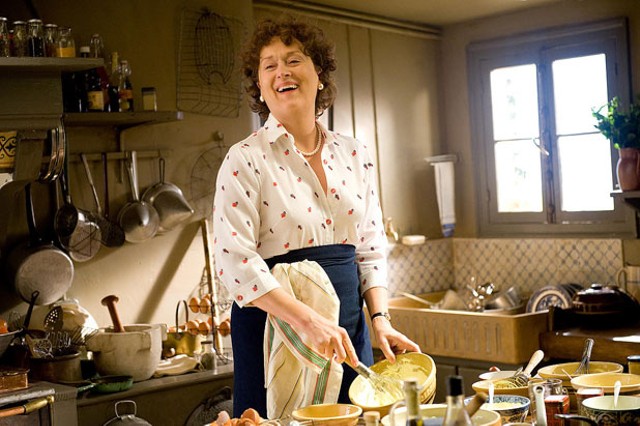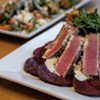Published August 11, 2009 at 5:09 p.m.
In 2003, a woman named Julie Powell, formerly a disgruntled secretary, pulled off one of the biggest coups in food-writing history. The preceding August, Powell had resolved to cook her way through Julia Child, Simone Beck and Louisette Bertholle’s Mastering the Art of French Cooking, Volume One — which includes 524 recipes, many complex — in a single year and blog about her progress. This was a woman who had never eaten a poached egg, let alone cooked one. As Powell neared the end of her exhausting project, New York Times food scribe Amanda Hesser featured her in a lengthy story, which resulted in a book deal.
That book spawned the film Julie & Julia, directed by Nora Ephron, which hit theaters last Friday and combines Powell’s story with scenes of Child’s life taken from her memoirs. Cute, pert Oscar nominee Amy Adams plays Powell, while a literally pitch-perfect Meryl Streep embodies America’s favorite butter-loving culinary giantess.
In real life, Powell has many detractors in and outside the foodie world. Unlike the milder version seen here on film, she swears like a sailor, bashes the localvore movement and isn’t shy about relating unsavory episodes in her past. After the events chronicled in the film, Powell cheated on her husband and documented the infidelity in her forthcoming book, Cleaving: A Story of Marriage, Meat and Obsession.
But, for all the criticism she may have courted and deserved, Powell achieved something unique: She gave blog hounds an honest, TMI-laced portrait of how hard it is to work full time, commute, maintain a relationship and cook a multicourse meal. This was no even-tempered “superwoman” like the kitchen goddesses on the Food Network. Powell’s readers rooted for her to succeed with each successive experiment, but her tearful failures may have helped them, secretly, to feel better about their own messy efforts in the kitchen.
Powell wasn’t good at facing disaster with aplomb, but Child’s unflappability was part of her appeal. In one famous scene from her cooking show, recreated in the film, a gob of potato pancake ended up spattered on the stove top during a mistimed flip. After mashing the remains of the concoction back together, Streep trills in Child’s voice: “If you’re alone in the kitchen, who is going to see?”
The movie is a triumph for Streep, who has mastered the art of portraying the woman who taught Americans to cook Veal Prince Orloff and fish mousse. Although the actress claims in interviews that she can’t cook, she looks right at home chopping mountains of onions and making a French omelette.
The story of how a big-boned diplomat’s wife helped write a magnum opus on French cuisine geared at “servantless American cooks” and became a TV star is worth a retelling, and the movie provides a handful of highlights spread over more than eight years. We watch Child struggle with the snarky director of Le Cordon Bleu culinary school, and the lengthy rewrites required to make Mastering palatable to publishers; then we share her joy when — spoiler alert — Knopf buys the book, thanks to a forward-thinking staffer (and now sometime Vermonter) named Judith Jones.
Child is an antidote to the modern breed of cleavage-baring, convenience-food-embracing culinary TV star. She is loud, gauche and refreshingly honest. In one scene, documented in Paul Child’s letters and mentioned in Powell’s book, Child pulls cannelloni pasta out of boiling water with her bare hands, shouting, “These damn things are as hot as a stiff cock.” (If you want to Google that phrase for proof, be sure to use quotation marks. Seriously.)
Julie & Julia is considerably less interesting in the modern sections telling Powell’s story, which suffer from expository dialogue so obvious it’s embarrassing. Adams’ Powell comes off as a sweet, meek and insecure young woman given to none-too-attractive “meltdowns.” Having bitten off more than she can chew with her blogging venture, she sobs on the kitchen floor after a chicken she’s trussing squirts out of her hands and spills its stuffing. Later, her husband walks out after she goes through a difficult episode with boeuf bourguignon (for the viewer, listening to her pronunciation is actually more painful than watching her flail).
The two Js certainly have their differences — in real life, according to Judith Jones, Child thought of Powell’s blog as a stunt — but director Ephron makes a point of highlighting their similarities. Both have to move for their husbands’ jobs; both are childless; both search for meaning and find it in food.
But the portrayal of the Childs’ marriage is far more nuanced and appealing than that of the Powells’. The ungainly 6-foot-2-inch Californian Julia was a nearly 40-year-old virgin when she met Paul (played by Stanley Tucci of Big Night), but it was a perfect match, and Ephron aptly intermingles Child’s lust for food and for her supportive husband. She shows the affectionate couple parlaying sensual meals into “afternoon delight.”
On the Julie side, dark-eyed actor Chris Messina, who appeared in Vicky Cristina Barcelona and a few episodes of “Six Feet Under,” plays her long-suffering spouse, Eric Powell. The script makes clear over and over that we’re supposed to view him as an ultra-nice guy: the kind who sweeps in to save the day with a brown-bag-encased pig trotter in hand (who needs flowers?). When lobsters are meeting their simmering demise and Julie is cringing in front of the TV, Eric stands watchfully at the pot. “You’re a saint,” Julie actually intones on several occasions.
But viewers may find that Eric comes off more like a smug, self-absorbed prig. When Julie frets about reporting culinary failures to her increasingly numerous blog readers, he mocks her pretensions as if she were doing nothing more significant than scribbling in a diary. The subtext seems to be that Eric was happier with a dejected wife floundering in search of meaning than one ensconced so deeply in a short-term self-improvement project that she can’t find time to pay attention to his, um, knockwurst. Over and over, through dialogue and visual cues such as Julie snoozing on the couch while Eric lies in bed, the movie suggests that Julie just isn’t giving it up enough.
Perhaps, like me, she was turned off by her husband’s chewing. If Messina had been raised by wolves or chimpanzees, I’m sure the tabloids would be on top of this news, so he must have some other reason for eating with his mouth open. Take the scene where he slurps chocolate custard from his finger, or another — perhaps the grossest in the film — where he chomps on bruschetta, mouth agape, while deep in conversation. Did Ephron ask him to eat this way? If so, why? If not, why didn’t she stop him?
OK, so maybe food writers are especially sensitive to these matters of table etiquette. But the excellent food styling of Ephron’s crew helps make up for Eric’s incivilities. The film serves up a visual banquet that makes multiplex popcorn seem even less adequate than usual: Desserts are glazed to a glistening sheen, birds emerge from the oven an appealing shade of mahogany, and a platter of sizzling sole meunière is boned tableside by an accomplished server.
Ephron uses visuals and even props to connect the two stories, separated by nearly 60 years. A scene will fade out on Julia and Paul going to sleep and fade in on Julie waking up, ready for another round of recipes. Both Js do much of their cooking in gorgeous, “flame”-colored Le Creuset Dutch ovens. Sure, it’s product placement, but it’s also the exact cookware someone making potages and stews would use in real life. Each woman’s kitchen fits her era and looks perfectly “cooked in”: There are always dishes in the sink, useful items strewn on the counter and ingredients close at hand.
I noticed only one culinary anachronism in the film, but it’s one that may tickle Vermonters. When Julie shops for cheese at Dean & Deluca, a wheel of Constant Bliss, made by Jasper Hill Farm in Greensboro, is front and center. The scene takes place in 2002; the cheese, as Jasper Hill co-owner and cheesemaker Mateo Kehler told me in a recent phone conversation, dates from 2003. Hey, they were close. And Kehler was pleased to hear his award-winning cheese has popped up in a feature film: “I guess our product-placement strategy is working,” he jested.
It’s hard to say why Ephron chose to portray Powell, who comes off as pushy and coarse in her own writing, as such a delicate flower. In the film’s two hours and 15 minutes, Adams doesn’t drop a single F-bomb. By page 8 of Powell’s book, she has described a gynecological exam, selling her ova for money (twice), and seeing a mentally ill woman bashing her head on a subway platform and shouting “fuck.” Now, the real Powell appears to be following in the footsteps of notable foodies such as M.F.K. Fisher, Gael Greene and Ruth Reichl, all of whom benefited financially from writing about their extramarital affairs.
The film leaves out some of Powell’s opinions, too. On her fourth day of blogging, back in August 2002, Powell dissed “localvore” types, saying: “People speak of gleaning the green markets for the freshest this, the thinnest that … as if what they’re doing is a selfless act of consummate care and good taste, rather than the privileged activity of someone who doesn’t have to work for a living … Julia Child isn’t about that.”
It’s a characteristically brash statement: Powell seems to have forgotten that Julia Child didn’t have to work for a living and did shop for seasonal produce (in 1950s France, there was hardly any other kind). Moreover, Child wasn’t exactly “about” easy cooking for the overworked. It’s hard to imagine a modern professional mom tackling her recipe for Timbales de Foies de Volaille — chicken liver custards that call for port, béarnaise sauce and optional canned truffle.
Warts and all, Powell is an interesting figure — if not as inspirational as Child. In the film, she’s more of a standard ditzy romantic-comedy heroine. Still, one non-Julia Child scene did make me mist up: The one where Julie arrives home, after being written up in the Times, to find her answering machine full of messages offering her agent representation or book deals. It’s hard to hate a Cinderella story, and Powell has probably inspired more than a few home cooks to start taking risks.
And when they do, they’re following in some (literally) big footsteps.
More By This Author
Speaking of Food, movies
-

Q&A: Howard Fisher Delivers Meals on Wheels With a Side of Good Cheer
Dec 20, 2023 -

Video: Howard Fisher Delivers Meals on Wheels
Dec 14, 2023 -

Next Month Brings the Final Curtain for Palace 9 Cinemas
Oct 27, 2023 -

Q&A: Alexis Dexter Rescued 57 Shelter Cats During the July Flood
Sep 13, 2023 -

Video: Two Months After the Flood, Alexis Dexter Rebuilds Kitty Korner Café in Barre and Continues to Rescue Cats
Sep 7, 2023 - More »
Comments
Comments are closed.
From 2014-2020, Seven Days allowed readers to comment on all stories posted on our website. While we've appreciated the suggestions and insights, right now Seven Days is prioritizing our core mission — producing high-quality, responsible local journalism — over moderating online debates between readers.
To criticize, correct or praise our reporting, please send us a letter to the editor or send us a tip. We’ll check it out and report the results.
Online comments may return when we have better tech tools for managing them. Thanks for reading.














































